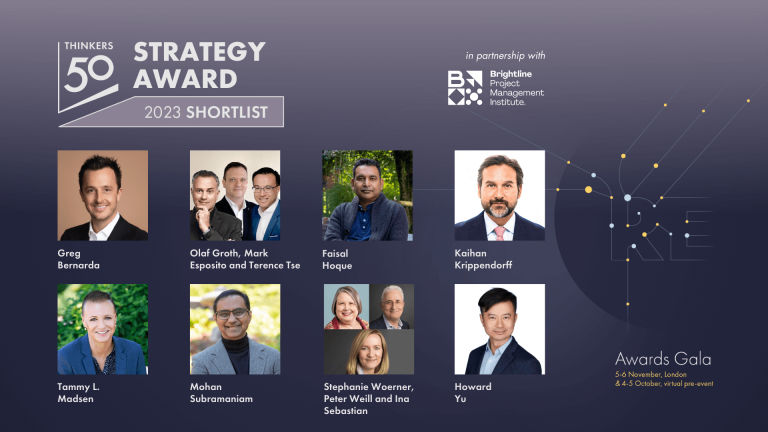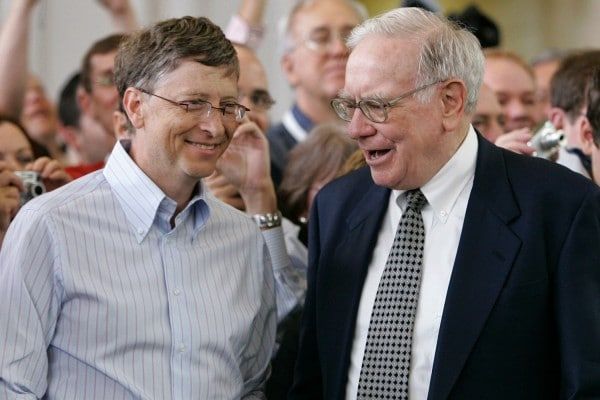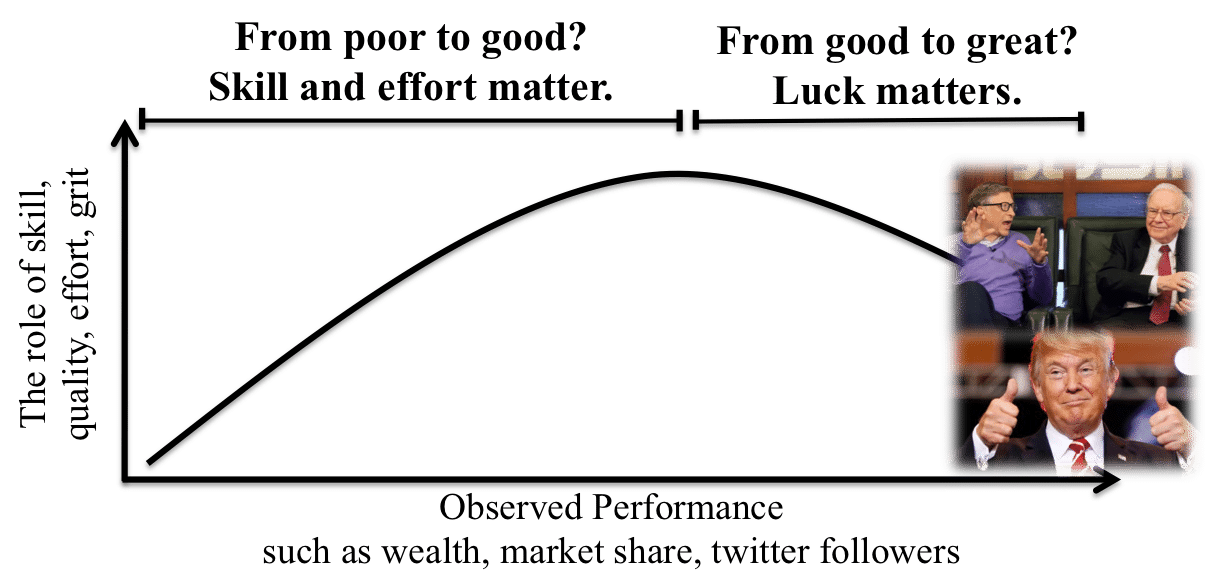

The winner should not take it all – because many of these exceptional performers are the luckiest and do not deserve all our attention and reward.
The idea that the exceptional performers are the most skilled or talented is flawed. The reason is that exceptional performances tend to occur in exceptional circumstances. Top performers are often the luckiest people, who have benefitted from being at the right place and right time.
Consider a college drop-out who turns out to be the wealthiest person in the world. Yes, Bill Gates may be very talented, but his extreme success perhaps tells us more about how circumstances beyond his control created such an outlier. Stated differently, what is more exceptional in this case may not be Gates’s talent, but the circumstances he happens to be in.
For example, Gates’s upper class background enabled him to gain extra programming experience when less than 0.01% of his generation then had access to computers; his mother’s social connection with IBM’s chairman enabled him to gain a contract from the then leading PC company, generating a lock-in effect that was crucial for establishing the software empire. Of course, Gates’s talent and effort play important roles in the extreme success of Microsoft. But that’s not enough for creating such an outlier. Talent and effort are likely less important than the circumstances (e.g., network externalities generated by customers’ demand for software compatibility boosted Gates’s initial fortune enabled by his social background) in the sense that he could not have been so successful without the latter. Assuming the “winners” are the best is likely lead to disappointment – even if you can imitate everything Bill Gates did, you will not be able to replicate his initial fortune.
One might argue that many exceptional performers gained their exceptional skill through hard work, exceptional motivation or “grit”, so they do not deserve to receive lower reward and praise. Some even suggested that there is a “magic number for greatness”, i.e., a ten-year, or 10,000 hour rule: many professionals and experts acquired their exceptional skill through persistent, deliberate practices. However, detailed analyses of the case studies of experts often suggest that certain situational factors beyond the control of these exceptional performers also played an important role.
For example, three national champions in table tennis came from the same street in a small suburb of one town in England. It turns out that there was a famous coach of table tennis happened to retire in this particular suburb. Many kids on that street were attracted to this sport because of this coach and three of them realized the “10,000 hour rule” and performed exceptionally well, including winning national championship. Their talent and efforts were of course essential for realizing their exceptional performances. But without their early luck (i.e., having a reliable coach and supportive families), just by practicing 10,000 hours without proper feedback would not normally lead to a randomly picked kid becoming a national champion in table tennis. We could also imagine a child with superior talent in table tennis suffering from early bad luck (e.g., not having a capable coach or being in a country where being an athlete was not considered to be a promising career) and never having a chance to realize her potential. The implication is that the more exceptional a performance is, the fewer meaningful, applicable lessons we could learn from this “winner”.
The figure attached provides a useful reminder to fight against our intuition that exceptional performers are better. Higher performers are likely better and the key for a novice, poor performer to become an experienced, good one is not about luck but about skill and effort. The conventional wisdom, such as “the harder I work the luckier I get” or “chance favours the prepared mind”, makes perfect sense when one focus on this moderate performance region. Moving from good to great, however, is a different story. Being at the right place (e.g., succeeding in a context where early outcome has enduring impact) and right time (e.g., having early luck) can be so important that it overwhelms merits.
We should not reward or imitate the “winners” but the “winners” should consider imitating Bill Gates (who became a philanthropist) or Warren Buffets (who proposed that richer Americans should pay higher taxes). The winners who appreciate their luck and do not take it all deserve more of our respect.

Originally from Taiwan, Chengwei Liu is now professor of strategy and behavioural science at Warwick Business School. His research on randomness asks whether performance differences should be attributed to skill or luck. Luck, it turns out, is often mistaken for skill.

Thinkers50 Limited
The Studio
Highfield Lane
Wargrave RG10 8PZ
United Kingdom

Thinkers50 Limited
The Studio
Highfield Lane
Wargrave RG10 8PZ
United Kingdom

| Cookie | Duration | Description |
|---|---|---|
| LANG | 9 hours | Linkedin set this cookie to set user's preferred language. |
| nsid | session | This cookie is set by the provider PayPal to enable the PayPal payment service in the website. |
| sp_landing | 1 day | The sp_landing is set by Spotify to implement audio content from Spotify on the website and also registers information on user interaction related to the audio content. |
| sp_t | 1 year | The sp_t cookie is set by Spotify to implement audio content from Spotify on the website and also registers information on user interaction related to the audio content. |
| tsrce | 3 days | PayPal sets this cookie to enable the PayPal payment service in the website. |
| x-pp-s | session | PayPal sets this cookie to process payments on the site. |
| __cf_bm | 30 minutes | This cookie, set by Cloudflare, is used to support Cloudflare Bot Management. |
| Cookie | Duration | Description |
|---|---|---|
| l7_az | 30 minutes | This cookie is necessary for the PayPal login-function on the website. |
| Cookie | Duration | Description |
|---|---|---|
| CONSENT | 2 years | YouTube sets this cookie via embedded youtube-videos and registers anonymous statistical data. |
| _ga | 2 years | The _ga cookie, installed by Google Analytics, calculates visitor, session and campaign data and also keeps track of site usage for the site's analytics report. The cookie stores information anonymously and assigns a randomly generated number to recognize unique visitors. |
| _gat_gtag_UA_10408481_1 | 1 minute | Set by Google to distinguish users. |
| _ga_ZP8HQ8RZXS | 2 years | This cookie is installed by Google Analytics. |
| _gid | 1 day | Installed by Google Analytics, _gid cookie stores information on how visitors use a website, while also creating an analytics report of the website's performance. Some of the data that are collected include the number of visitors, their source, and the pages they visit anonymously. |
| Cookie | Duration | Description |
|---|---|---|
| NID | 6 months | NID cookie, set by Google, is used for advertising purposes; to limit the number of times the user sees an ad, to mute unwanted ads, and to measure the effectiveness of ads. |
| test_cookie | 15 minutes | The test_cookie is set by doubleclick.net and is used to determine if the user's browser supports cookies. |
| VISITOR_INFO1_LIVE | 5 months 27 days | A cookie set by YouTube to measure bandwidth that determines whether the user gets the new or old player interface. |
| YSC | session | YSC cookie is set by Youtube and is used to track the views of embedded videos on Youtube pages. |
| yt-remote-connected-devices | never | YouTube sets this cookie to store the video preferences of the user using embedded YouTube video. |
| yt-remote-device-id | never | YouTube sets this cookie to store the video preferences of the user using embedded YouTube video. |
| yt.innertube::nextId | never | This cookie, set by YouTube, registers a unique ID to store data on what videos from YouTube the user has seen. |
| yt.innertube::requests | never | This cookie, set by YouTube, registers a unique ID to store data on what videos from YouTube the user has seen. |
| Cookie | Duration | Description |
|---|---|---|
| DEVICE_INFO | 5 months 27 days | No description |
| loglevel | never | No description available. |
| m | 2 years | No description available. |
Thinkers50 Limited has updated its Privacy Policy on 28 March 2024 with several amendments and additions to the previous version, to fully incorporate to the text information required by current applicable date protection regulation. Processing of the personal data of Thinkers50’s customers, potential customers and other stakeholders has not been changed essentially, but the texts have been clarified and amended to give more detailed information of the processing activities.